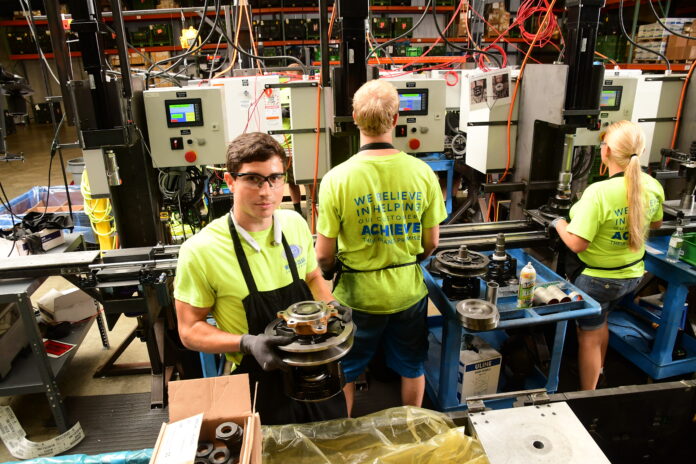
World Class Industries draws on its historic strengths to weather the new economy’s wave of workplace and supply disruptions.
“That’s been very much a roller coaster ride,” CEO Brent Cobb said. “It’s started to get better but it’s still pretty touch-and-go.
The thing is, Hiawatha-based WCI’s emphasis on quick adaptation and worker training helps the company pivot to accommodate its customers’ supply disruptions.
“We have our workforce and systems set up that way to embrace (change),” Mr. Cobb said. “We think that’s an important quality we can bring to our customer. It differentiates us in the marketplace.”
That dates back to the company’s 1953 founding as Iowa Midland Supply, which catered to the region’s then-booming manufacturing sector. Mr. Cobb’s father Pat Cobb and another partner purchased the company in 1993, with the elder Mr. Cobb and another partner spinning off what’s today’s WCI.
“The market of the company has always been selling manufacturing companies, mostly OEMs,” or original equipment manufacturers, Mr. Cobb said. “John Deere was a major significant customer.”
Subassembly work for OEMs such as Deere & Company remains the foundation of WCI’s business, supplemented lately by a new direct-to-market segment.
“The other end market that we’re pursuing is middle-market product companies looking to focus on engineering, and not interested in procuring the components and assembling them into the end products and shipping them to their customers,” Mr. Cobb said.
That has led WCI to such customers as Ferndale, Wash., based Cutsforth, which supplies maintenance kits and repair services for heavy electrical generators. WCI assembles and ships Cutsforth’s EasyChange brush holder, a tool for changing the brushes on generators while they’re in operation, reducing power outages due to maintenance.
WCI also assembles the SIMPAS agricultural chemical applicator for American Vanguard. The system allows operators to custom-apply multiple products simultaneously during planting.
Such products, intended for delivery to dealers who in turn sell to end users, are a natural complement to WCI’s traditional sub assembly work for customers such as Caterpillar. Components assembled at WCI go into Cat’s diesel generator sets.
“One of our core values is being agile,” Mr. Cobb said. “That fits into our strategy. We have a certain type of customer that has a kit of variations to what they’re providing to end customers, and new products coming in.”
That approach has served the company well when it comes to helping customers cope with workforce and supply challenges. WCI now employs just under 260 at eight stateside locations in Iowa, Illinois, and Georgia, with another in Kaiserslautern, Germany.
“There’s no one location that’s terribly big,” Mr. Cobb observed. “That’s part of our agility.”
Expansion decisions are driven by customer needs.
“The location strategy is really being in close proximity to the end customer,” Mr. Cobb said. “When you assemble parts, they get more expensive to ship. The closer we can get to our customers, we feel the better we can be a partner to them.”
That extends to the way in which WCI identifies potential new business.
“We try to get that out in the early in the conversation, and understand what their motivation is,” Mr. Cobb said. “In that back and forth we can calculate how good a fit we are for the companies.”
Mr. Cobb expects WCI’s core philosophy will continue to serve it well.
“Our goal is to continue to grow in both (customer) segments, with a lot of focus in the middle-market product, and that’s new for us,” he said. “We’ve made good progress in diversifying our customer base.”
World Class Industries details:
2022 Revenue: $344.44 M
Established: 1953
Top Executive: Brent Cobb, President & CEO
This article was originally published in the CBJ’s Largest Privately Held Companies magazine.
In 2023, this magazine celebrated its tenth anniversary, after a three-year hiatus due to the pandemic. It featured a look back through the last decade and a glimpse into the future of the Corridor’s biggest, and most impactful, companies. Through in-depth interviews and people-focussed articles, the magazine explored how these industry titans have supported and inspired their communities through hardship and prosperity, and how they plan to continue their involvement for years to come.




